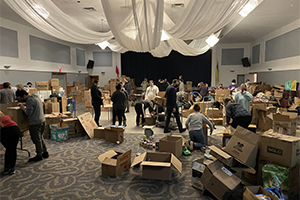Although he’s almost 8,000 kilometres away in London, Ont., Sergii Nevmerzhytskyi feels the effects of the war in Ukraine.
His parents, other relatives, and his wife’s family live in Ukraine and have been providing frequent updates ever since Russia invaded Ukraine in late February. Those updates include news that they’ve had to relocate – over and over again; the urgent need for medicine, sleeping bags, and other supplies; and – most disturbing – their feelings of fear and uncertainty.
Instead of feeling powerless that he must hear of the events unfolding from afar, that news has empowered him to give back to his home country with help from others in the London community.
Nevmerzhytskyi, an Ivey PhD candidate who immigrated to Canada from Ukraine in 2016, has been working with the London Ukrainian Centre on a humanitarian aid drive for Ukraine. Inspired by an email his PhD supervisor distributed to share news of a local rally in support of Ukraine, Nevmerzhytskyi sent out his own appeal to the Ivey community for donations just days after the Russia-Ukraine conflict began.
“I realized the [Ukrainian Centre’s] audience could be broader if I followed up with other people. I reacted impulsively,” he said. “Rallying is good, but there are specific needs. I thought I should help the way I can the most.”
Related to this story
Support from the Ivey community
He has since been accepting goods and funds at Ivey and adding them to the London Ukrainian Centre’s collection destined for Ukraine and Ukrainian refugee camps. To date, more than $198,500 and 4,000 boxes of donations in total have been collected through the Centre’s Humanitarian Aid to the People of Ukraine and about 30 people from Ivey have reached out to Nevmerzhytskyi directly to lend support.
“There were so many responses from Ivey people willing to help out in so many ways. It encourages me a lot. It means that I’m doing something important. People don’t just get together and do a good thing. They need to be informed about the possibilities to do those good things,” he said.
Next steps include helping Ukrainian refugees, who might soon arrive in London, to find housing, work, and childcare while still fundraising for necessities, such as medical supplies and bullet-proof vests. He encourages local businesses to offer employment to Ukrainian refugees and for Londoners to consider offering short-term accommodation by contacting the London Ukrainian Centre.
Keeping the crisis top of mind
Nevmerzhytskyi said he expects there will be an influx of refugees in May as well as the need for supplies will continue, so it’s important to keep the momentum going. In particular, he hopes to see institutions respond more proactively since the bulk of donations have been from individuals – and even those have tapered off.
“In the first few days, there were a lot of donations flowing and that is very much appreciated, but the war is still there,” he said. “We need to switch from hoping the war will end soon to a mental state where we accept some kind of peace tax so that every month we donate something.”
And although he has a personal connection to Ukraine, he said the conflict there has been felt around the world and everyone should do what they can to help out.
“You can’t live in a society and just take from it. You need to give back, not just take, because if you take, you exhaust the place where you live and society suffers,” he said.
This is an important thing. It’s about life. It’s about people. What can be more important?”



